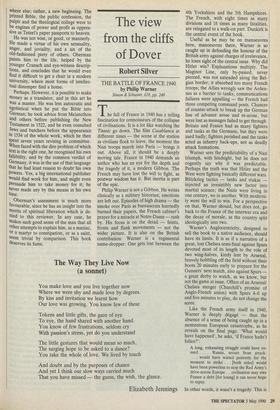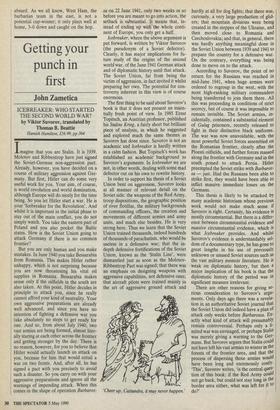The view from the cliffs of Dover
Robert Silver
THE BATTLE OF FRANCE 1940 by Philip Warner Simon & Schuster, £16, pp. 249 The fall of France in 1940 has a telling fascination for connoisseurs of the collapse of civilisations. It is a lot like watching the Titanic go down. The film Casablanca at different times — the scene at the station as civilians flock to leave, the moment the Nazi troops march into Paris — brings it out. Above all, it should be a deeply moving tale. France in 1940 demands an author who has an eye for the depth and the tragedy of it, a modern Gibbon. The French may have lost the will to fight, as postwar wisdom has it. But inertia is part of the epic.
Philip Warner is not a Gibbon. He writes clinically as a military historian; emotions are left out. Episodes of high drama — the smoke over Paris as bureaucrats hurriedly burned their papers, the French cabinet's prayer for a miracle at Notre-Dame — rush by. His focus is on the detail — feints, fronts and flank movements — not the wider picture. It is also on the British contribution: Warner is a regimental name-dropper. One gets lost between the 4th Yorkshires and the 5th Hampshires. The French, with eight times as many divisions and 16 times as many fatalities, are relegated to a walk-on part. Dunkirk is the central event of the book.
Useful as he may be on manoeuvres here, manoeuvres there, Warner is so caught up in defending the honour of the British army against charges of irrelevance, he loses sight of the central issue. Why did Hitler win? Explanations multiply. The Maginot Line, only by-passed, never pierced, was not extended along the Bel- gian border; it absorbed too many French troops; the Allies wrongly saw the Arden- nes as a barrier to tanks; communications failures were appalling — the French had three competing command posts. Chances of counter-attack to break up the German line of advance arose and re-arose, but were lost as messages failed to get through. Britain and France had as many fighters and tanks as the Germans, but they were used badly; fighters perished and the tanks acted as infantry back-ups, not as deadly attack formations.
Warner sees the predictability of a Nazi triumph, with hindsight, but he does not cogently say why it was predictable. Perhaps the truth was that Hitler and the West were fighting basically different wars. Blitzkrieg tactics — tanks and stukas injected an irresistibly new factor into martial science; the Nazis were living in one century, we in another. With moderni- ty went the will to win. For a perspective on that, Warner should, but does not, go back to the France of the interwar era and the decay of morale, as the country split ideologically into two.
Warner's Anglocentricity, designed to sell the book to a native audience, should have its limits. It is as if a narrative of a great, lost Chelsea semi-final against Spurs devoted most of its length to the role of two wing-halves, kindy lent by Arsenal, bravely hobbling off the field without their boots 20 minutes early to prepare for the Gunners' next match, also against Spurs a great derby to watch, as we know, but not the game at issue. Offers of an Arsenal/ Chelsea merger (Churchill's promise of Anglo-French union) with Spurs 4-0 up and five minutes to play, do not change the score.
Like the French army itself in 1940, Warner is deeply &gage — thus the absence of a sense of being caught up in a momentous European catastrophe, as he reveals on the final page. 'What would have happened', he asks, 'if France hadn't fallen?': A long, exhausting struggle could have en- sued Russia, secure from attack- . . . would have waited patiently for the moment to strike . . . [both sides] would have been powerless to stop the Red Army's drive-across Europe . . civilisation may owe France a debt [for losing] it can never hope to repay.
In other words, it wasn't a tragedy. This is absurd. As we all know, West Ham, the barbarian team in the east, is not a potential cup-winner; it only plays well at home, 3-0 down and caught on the hop.



















































 Previous page
Previous page